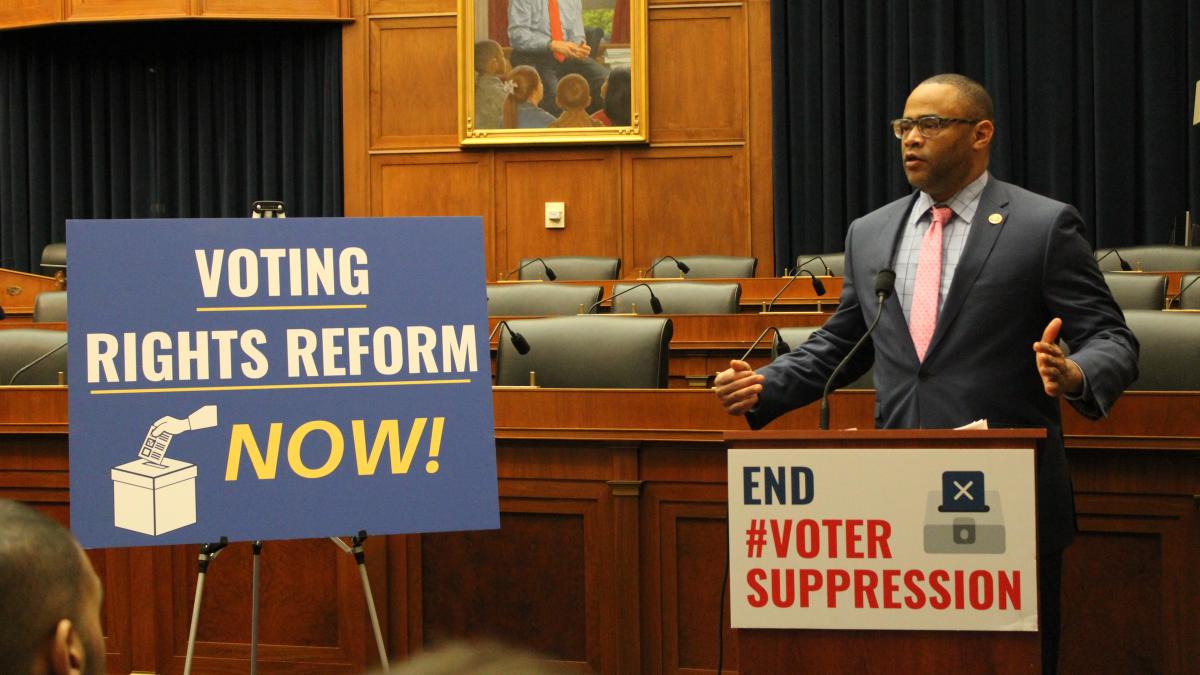Voting Rights

More on Voting Rights
Fort Worth, TX – Today, Congressman Marc Veasey, TX-33, hosted local community leaders at Mount Zion Baptist Church to commemorate the 50th anniversary of the Voting Rights Act. Local civil rights leaders shared their firsthand accounts from the frontline of the fight for the right to vote.
KERA Unlimited – KRLD
Congressman Marc Veasey, a Democrat from Fort Worth, was lead plaintiff in the case. He joined KERA's Bill Zeeble for a look at the decision.
Interview Highlights: Marc Veasey on ...
WASHINGTON, D.C. – Congressman Marc Veasey, TX-33, released the following statement marking the 50th anniversary of the Voting Rights Act of 1965:
The Hill
In a timely decision issued Wednesday, a U.S. appeals court ruled that Texas's tough voter ID law, adopted in 2013, would effectively discriminate against minority voters in violation of the Voting Rights Act. The ruling has only fueled the Democratic criticisms of similar laws around the country, while amplifying their calls to renew VRA protections shot down by the Supreme Court two years ago.
Dallas Voice
Rep. Marc Veasey, D-Fort Worth, and lead plaintiff in the case, applauded the bittersweet victory.
"As a champion for voting rights, I am proud that with this decision, the U.S. Court of Appeals for the 5th Circuit has taken the first steps towards ensuring that all Texans have unfettered access to the ballot box," he said in a statement.
KGNS
The Texas law was challenged by U.S. Congressman Marc Veasey (CD33 – Texas) and other minority plaintiffs shortly after it was adopted in 2011.The Veasey plaintiffs have successfully argued that the law is discriminatory at every stage of the litigation.
Houston Press
In 2012, a federal court ruled that Texas's voter ID law violated Section 5 of the Voting Rights Act and stopped it from going into effect. However, in 2013, the U.S. Supreme Court struck down a critical component of the landmark civil rights law that had required states, like Texas, with a history of discrimination to get federal approval before making any major changes to state voting or election laws. Congressman Marc Veasey (D-Fort Worth) ultimately filed a lawsuit challenging the law (again) when then-Gov.
Examiner
Marc Veasey (D), who was the lead plaintiff in the case against the state, told the Texas Tribune that the ruling gives all Texans a shot at making their voice heard, and called on the Gov. and embattle state Attorney General Ken Paxton to end their efforts on discriminating against the state's minority residents.
Fort Worth Star-Telegram

Former state Sen. Wendy Davis, D-Fort Worth, and U.S. Rep. Marc Veasey, D-Fort Worth, Max Faulkner Star-Telegram archives
Austin-American Statesman
The case, Veasey v. Abbott, carries the names of U.S. Rep. Marc Veasey, a Democrat from Fort Worth and the primary plaintiff in the case, and Republican Gov. Greg Abbott, who is the defendant.
[…]
Civil rights groups -- later joined by the Justice Department -- responded with a lawsuit to block the law. The case was heard by Ramos, an appointee of President Barack Obama, and she ruled in favor of Veasey in October 2014.